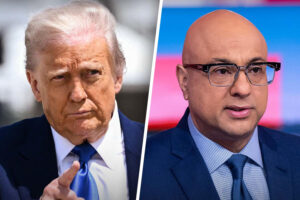Congress
Capitol agenda: Insider trading is Mike Johnson’s next Epstein
Speaker Mike Johnson’s September to-do list is getting tougher by the day.
As Blue Light News scooped Tuesday, Rep. Anna Paulina Luna (R-Fla.) is planning to file a discharge petition to force a floor vote on banning stock trading by members of Congress. Like the parallel push for a vote on releasing the Epstein files, it’s poised to pit Johnson against rank-and-file Republicans who are thirsty to challenge elite corruption – whether their leadership likes it or not.
Luna’s move puts Johnson in a bind.
Johnson has signaled that he’s personally supportive of restricting stock trading by lawmakers. But allowing a vote to happen would trigger backlash from many fellow Republicans — and for what? The bill probably wouldn’t go anywhere in the Senate.
Yet if Johnson stands in the way, he risks fueling a narrative triggered by the Epstein fight that he’s protecting the rich and powerful and against transparency.
Luna has a ways to go before she gets the 218 signatures needed to force a vote. But she has some political momentum on her side. The House Ethics Committee said Friday that Rep. Mike Kelly’s wife bought shares in steelmaker Cleveland-Cliffs after Kelly’s office learned that a Commerce Department action could benefit the company. Kelly has said he and his family “look forward to putting this distraction behind us.”
Johnson’s saving grace might be a GOP division over the right approach to executing a crackdown. Lawmakers have been meeting for months to try to hammer out a consensus bill, with some members concerned the process isn’t going anywhere. Luna wants to force a vote just on a bill from Rep. Tim Burchett. Senate Homeland Security will mark up its own stock trading restrictions Wednesday.
Rep. Chip Roy, who could play a pivotal role in any effort to derail Luna’s push as a member of the Rules Committee, is among those leading bipartisan talks on a potential compromise around a broader bill.
“Since I introduced the first bill on this subject, we’ve built a coalition in support of a comprehensive and strong solution to end stock trading for members of Congress,” Roy said. “We’re working over August to merge various ideas and get Republican leadership to move on it. We gave them time to finish the [megabill] — that time is passed.”
Rep. Seth Magaziner, the Rhode Island Democrat co-leading legislation with Roy, said he believes they are “quite close” on a consensus bill coming together — possibly in August. But it would be for “Congress only,” and not extend any stock trading ban to the president and vice president, as some Democrats are pushing.
Lawmakers involved in the talks are also aiming for legislative branch enforcement, which is missing from the Burchett bill that relies on Justice Department enforcement. Burchett’s legislation also doesn’t address when lawmakers who currently own stocks would have to pay taxes after divesting.
“Where you’ll start losing Democrats is if the bill doesn’t have teeth,” said Magaziner, who argues that the Burchett bill alone will have problems drawing enough support from both sides of the aisle.
What else we’re watching:
— Schumer’s Epstein announcement: Senate Minority Leader Chuck Schumer and other Senate Democrats plan to hold a press conference Wednesday afternoon on a new effort to get the “full Epstein files.”
— Trump nominee staredown: Senate GOP leaders are threatening to rewrite the chamber’s rulebook if Democrats don’t agree to expedite dozens of President Donald Trump’s nominees before August recess. Senate Majority Leader John Thune told Blue Light News that Republicans could revisit steps they took in 2018 to shorten debate time between nominees.
— Commerce votes on TSA bill: Senate Commerce Chair Ted Cruz said he’s “confident” his committee will approve legislation Wednesday that would put new guardrails on facial recognition technology used by the TSA. Travel lobbyists are raising concerns that the bill would make it more difficult to ensure airline passengers’ safety.
Mia McCarthy, Jordain Carney, Calen Razor and Benjamin Guggenheim contributed to this report.
Congress
Comer issues subpoenas for DOJ’s Epstein files, depositions with former officials
The House Oversight Committee on Tuesday issued subpoenas for Department of Justice records on the Jeffrey Epstein investigation, as well as for interviews with a slate of former government officials in connection to the case.
Oversight Chair James Comer (R-Ky.) announced that he was summoning nearly a dozen former officials to appear for depositions on the Epstein investigation — a list that includes former President Bill Clinton and former Secretary of State Hillary Clinton.
Former U.S. Attorneys General William Barr, Alberto Gonzales, Jeff Sessions, Loretta Lynch, Eric Holder and Merrick Garland, as well as former FBI Directors Robert Mueller and James Comey were also tapped to give testimony in connection to the case.
Comer was required to send the subpoenas after a Democratic-led subcommittee vote in July.
The move is the latest in a broader battle over the Epstein files, which took the Trump administration by storm last month as anger boiled over from within MAGA circles about the administration’s handling of the case.
The committee’s subpoena of Bill Clinton in particular seems more symbolic than substantive. No former president has ever testified to Congress under the compulsion of a subpoena — and lawmakers have tried only twice before: once in 1953, when the House Un-American Activities Committee subpoenaed Harry Truman, and once in 2022, when the Jan. 6 select committee subpoenaed Donald Trump.
Neither president testified in those instances, and the Justice Department has long cited Truman’s example — though not backed by any legal precedent — to suggest that it is improper for Congress to compel even former presidents to testify, given separation of powers concerns.
While the president has tried to brush off the growing outcry — and lashed out at The Wall Street Journal over its report of a letter he allegedly wrote to the disgraced financier for his birthday, which he denies authoring — Republicans have split over their approach to the issue.
Trump has publicly raged about the case, suggesting it was a Democratic plant to undermine him. He’s also sought to mollify his angry base, directing Attorney General Pam Bondi to seek the release of grand jury documents amid outrage from within his own MAGA sphere, although it is not clear if there would be anything revelatory in those documents.
Deputy Attorney General Todd Blanche also met with Epstein co-conspirator and convicted sex offender Ghislaine Maxwell last month amid the heightened public pressure.
Maxwell, who is serving a 20-year prison sentence for child sex trafficking and other crimes, was moved to a minimum-security federal prison camp in Texas just days after her meetings with Blanche — a transfer that came as Trump has made clear that a pardon for the convicted sex offender is within his purview.
Kyle Cheney contributed to this report.
Congress
Trump-Schumer standoff heads for fall rematch
Donald Trump and Chuck Schumer went head-to-head last week for the first time in nearly six months. Turns out they were only shadow-boxing — and the real bout is still to come.
The president pulled the plug on a possible deal to confirm some administration nominees, while the Senate’s top Democrat — under pressure from his party to take a tougher stand — boasted afterward that Trump came away with nothing.
Now, the two men are headed toward a fall rematch with much higher stakes: whether to keep the federal government open past a Sept. 30 funding deadline.
Despite decades of history between them, their relationship is now almost nonexistent. They haven’t had a formal one-on-one meeting since Trump’s second inauguration. And they did not speak directly as part of the nominations negotiations, according to two people granted anonymity to discuss private details.
The unraveling of a typical pre-summer-recess nominations deal has many on Capitol Hill concerned about what is to come. While other congressional leaders are sure to figure into the negotiations, it’s Schumer — who will determine whether Senate Democrats filibuster spending legislation — and Trump — who has to sign any shutdown-averting bill — who will be the key players.
“It would be better if those two negotiated,” Sen. Kevin Cramer (R-N.D.) said of Trump and Schumer.
Cramer said Senate Majority Leader John Thune served last week as the “arbitrator” ferrying between the “bare-knuckled” New Yorkers during the recent nominations fight. And Speaker Mike Johnson will have his hands full trying to keep his thin majority united behind a spending strategy that will keep the pressure on Democrats.
Democrats believe the onus is on Thune and Johnson to wrangle Trump — the dominant leader of their party — and convince him to come to the table. They are using their hardball tactics over nominations as a warning shot for the fall funding fight.
“Sooner or later, Donald Trump — Mr. ‘Art of the Deal,’ or so he claims — is going to have to learn that he has to work with Democrats if he wants to get deals, good deals, that help the American people,” Schumer said late Saturday night as the Senate prepared to leave town for the summer. “Going at it alone will be a failed strategy.”
Trump’s decision to temporarily abandon his confirmations push rather than give in to what he called “political extortion” from Schumer allowed the embattled Democratic leader to do a pre-recess victory lap after taking heat from the party base for months.
Schumer came under fierce criticism in March for helping to advance a shutdown-avoiding spending bill written solely by Republicans. He warned at the time that a shutdown would only empower Trump and that the dynamic would be different come September as, he predicted, Trump became more unpopular. Nine other members of his caucus joined him.
Trump initially urged Republicans to stay in Washington until all of the roughly 150 pending nominees were confirmed — a demand that could have essentially erased the Senate’s planned four-week recess.
But Schumer and Democrats demanded that Trump unfreeze congressionally approved spending in return for consenting to the swift approval of some nominees. Trump would not pay the price.
In a post where he blasted “Senator Cryin’ Chuck Schumer,” Trump instructed senators to go home. Republicans flirted with adjourning the Senate to let Trump make recess appointments, but that would have required recalling the House — and reviving the Trump-centered drama over the Jeffrey Epstein files. Instead, they are vowing to pursue a rules change later this year to quickly push Trump’s nominees through the Senate.
Schumer relished the Truth Social post, putting a poster-sized version on display next to him as he spoke to reporters Saturday night and comparing it to a “fit of rage.”
He kept the heat on Monday, joining with House Minority Leader Hakeem Jeffries to demand a so-called “four corners” meeting with Thune and Johnson to discuss a government funding strategy lest a government shutdown hit Oct. 1. (Republicans, who accuse Schumer of “breaking” the funding process, haven’t responded.)
Though Schumer and Thune have had informal talks about September, they haven’t delved beyond the broad strokes. The South Dakota Republican, asked about Trump and Schumer, predicted the two will have an “evolving relationship.”
“At some point, obviously, there are certain things they are just going to have to figure out, because on some of these things where we need 60 [votes] there are going to have to be conversations,” Thune said in a brief interview.
Schumer and Thune joined 85 other senators to advance the chamber’s first bipartisan funding package late last week, in a show of unity that senators hope will pave the way for another package of spending bills in September. But Congress is still expected to need a short-term funding patch by Oct. 1, and there are early signs of splinters among Republicans about what that step should look like.
But the nomination fight also underscores that Trump is the ultimate wild card heading into the showdown.
At various points heading into and over the weekend, Republicans and Democrats appeared to believe they were close to an agreement and just needed Trump’s blessing, only for it to unravel.
Sen. Richard Blumenthal (D-Conn.) said that Schumer’s “satisfaction” in the wake of the nominations showdown is justified but added it was impossible to predict if Trump would come to the table in September.
“One of the most striking and salient facts about Donald Trump is his unpredictability,” he said.
Schumer and Senate Democrats have been trying to game out multiple scenarios in closed-door caucus meetings. They have also been discussing what demands to make in exchange for their votes to fund the government. Those could range from an ironclad commitment from Republicans that they won’t agree to more claw back more funding or seeking policy concessions, such as unfreezing foreign aid or National Institutes of Health funds, or pursuing a deal on soon-to-expire Affordable Care Act tax credits.
Democrats have their own internal fault lines to manage. Already Pennsylvania Sen. John Fetterman is vowing to vote to keep the government open, while others like Sen. Elizabeth Warren of Massachusetts are striking a more combative tone.
Republicans’ unwillingness to commit to rejecting future spending clawbacks, she said, shows “the budget negotiations weren’t worth the paper they were written on.”
But Schumer, for now, is savoring the moment. After he wrapped up his news conference Saturday night, the smiling Democratic leader insisted his party was “more effective and more unified than the Republicans” as he kibitzed with reporters.
“What do you think — the art of the deal?” he asked, his arm around a poster-board display of Trump’s “Cryin’ Chuck” post.
Jake Traylor contributed to this report.
Congress
MTG asks Trump to pardon George Santos
Rep. Marjorie Taylor Greene asked President Donald Trump on Monday to grant clemency to former Republican Rep. George Santos, the notorious fabulist who began his seven-year prison sentence last month.
Greene, a close Trump ally and conservative firebrand, said she sent a letter to the Department of Justice asking them to present a case to Trump for clemency consideration for the former New York member of Congress.
In the letter, she said Santos’ sentence for wire fraud and aggravated identity theft charges “extends far beyond what is warranted.”
“George Santos has taken responsibility. He’s shown remorse. It’s time to correct this injustice,” Greene said on X.
Santos, who pleaded guilty in April and reported to federal prison in New Jersey on July 25, became a household name shortly after he was elected to Congress in 2022, when The New York Times reported several outlandish lies he told about his backstory during his congressional campaign.
The details of Santos’ falsehoods, his misuse of campaign funds and falsifying financial records were ultimately compiled in a scathing House Ethics Committee report in 2023, triggering a House vote to expel Santos later that year.
When asked on Friday about possibly pardoning Santos, Trump acknowledged the former New York congressman’s wrongdoing but didn’t rule out granting him clemency.
“Nobody’s talked to me about it,” he said in an interview with Newsmax.
Santos has repeatedly said he’s asked the Trump administration to consider pardoning him. In a social media post weeks before he reported to prison, he claimed that House Speaker Mike Johnson had “blocked” the Trump administration from granting him clemency.
While presidents in recent history have waited until the end of their terms to sign pardons and commutations, Trump has already granted clemency to many people in the first year of his term — some of whom, like Santos, hadn’t completed their sentences.
On his first day in office, Trump granted clemency to hundreds of people involved in the Jan. 6, 2021 attack on the US Capitol. Since then, he’s issued dozens more pardons and commutations, including to former Illinois Gov. Rod Blagojevich and to Todd and Julie Chrisley, the reality TV stars convicted of bank fraud and tax evasion.
-
Uncategorized9 months ago
Bob Good to step down as Freedom Caucus chair this week
-

 The Josh Fourrier Show9 months ago
The Josh Fourrier Show9 months agoDOOMSDAY: Trump won, now what?
-

 Politics9 months ago
Politics9 months agoWhat 7 political experts will be watching at Tuesday’s debate
-

 Politics9 months ago
Politics9 months agoHow Republicans could foil Harris’ Supreme Court plans if she’s elected
-
Economy9 months ago
Fed moves to protect weakening job market with bold rate cut
-

 Politics9 months ago
Politics9 months agoRFK Jr.’s bid to take himself off swing state ballots may scramble mail-in voting
-
Economy9 months ago
It’s still the economy: What TV ads tell us about each campaign’s closing message
-

 The Dictatorship6 months ago
The Dictatorship6 months agoPete Hegseth’s tenure at the Pentagon goes from bad to worse










